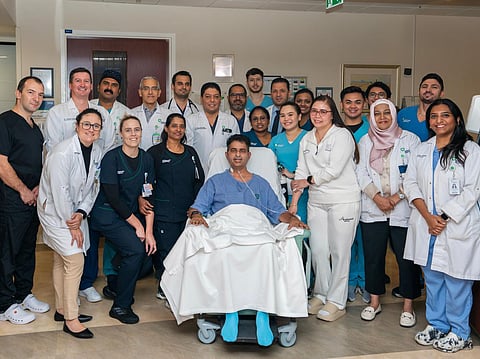American Hospital Dubai successfully rescues a patient from the brink of respiratory failure
Hospital’s multidisciplinary excellence set the patient firmly on the path to recovery

A 39-year-old healthy male with no significant past medical history was transferred to American Hospital Dubai from an external facility for treatment of Acute Hypoxemic Respiratory Failure (AHRF) secondary to viral pneumonia. AHRF occurs due to severely low blood oxygen levels, which affects the lungs’ ability to function normally.
The patient was hospitalised at the previous facility for an acute febrile illness accompanied by respiratory distress. His respiratory function worsened, and he had a cough, shortness of breath, fever, and chills. His respiratory viral panel test returned positive for H1N1 influenza, and his oxygen saturation of 70 per cent and initially required BiPAP support.
He was placed on antibiotic therapy, antiviral medications, and systemic corticosteroids; however, his condition continued to deteriorate. He required high ventilator support and oxygen, with 100 per cent FiO2 and a PEEP of 12. FiO2 is the fraction of inspired or inhaled oxygen (FiO2 per cent) and the corresponding positive end-expiratory pressure (PEEP). These are interventional measures employed in mechanical ventilation for patients experiencing severe respiratory distress. Additionally, the patient was administered deep sedatives and paralytic agents.
Despite these measures, his oxygen saturation did not improve, and he was placed in aprone position to facilitate his breathing. The following day, his arterial blood gas (ABG) results still indicated severe hypoxemia with a PO2 of 52, which falls on the lower end of healthy levels, which are typically above 75.
When the patient presented at the American Hospital Dubai, he was examined by Dr Hasan Al Azzawi, Consultant of Pulmonary and Critical Care, American Hospital Dubai.
“When we admitted him to the ICU, he showeda blood oxygen saturation of 72 per cent on 100 per cent FiO2,” said Dr Al Azzawi. “His positive end-expiratory pressure (PEEP) was 14. He was placed in a prone position, administered inhaled nitric oxide in addition to his other medications, including deep sedatives and paralytic agents. His chest X-ray revealeda severe lung inflammation/infection.”
In the first 60 minutes of the patient’s admittance at American Hospital Dubai, a decision was madeto escalate mechanical support and put him on Veno-Venous Extracorporeal Membrane Oxygenation support (VV ECMO). “Given the patient's severe condition, this procedure starts when standard ventilatory interventions are insufficient,” explained Dr Al Azzawi.
VV ECMO is a mechanical assistance device that provides cardiopulmonary support. It enables the patient's venous (deoxygenated) blood to flow through the machine, which oxygenates it before returning it to the patient’s circulation. This function is critical because severely inflammed lungs cannot oxygenate blood.
Our lungs serve as the distribution centre for oxygenated blood, taking the oxygen from the air we breathe and diffusing it into the blood, which is then carried to the heart to be pumped to the rest of the body.
“TheECMO team at American Hospital was notified, and within two hours of his arrival, the patient was cannulated and placed on VV ECMO support. His blood oxygen saturation improved immediately to 99 per cent,” said Dr Al Azzawi.
The patient was continuously managed and monitored in the ICU, and his oxygen requirements steadily improved. Chest imaging revealed an improvement in bilateral infiltrates, meaning the infection in his lungs was diminishing. On Day 9 post-cannulation, he was completely weaned off the VV ECMO. “We reduced his sedative dosages, and he exhibited spontaneous awakening. Breathing trials were conducted, and the patient passed them successfully,” informed Dr Al Azzawi.
“Two days after the VV ECMO procedure, the tube was removed from his throat, and he was placed on high-flow nasal cannula oxygen support,” he added.
The patient’s condition continued to progress. “His chest x-ray after the procedures showed a near complete resolution of the ‘infiltrates’ in his lungs,” said Dr Al Azzawi. “He was administered physical and occupational therapy, weaned off oxygen support completely, encouraged to move and walk, and was subsequently transferred out of the ICU to the medical ward.”
The patient is now at home and instable condition on room air without oxygen support.
“We are extremely happy with the treatment outcome,” said Dr Al Azzawi. “American Hospital Dubai’s world-class treatment protocols, exceptional teamwork, and expertise in complex diseases position it as a leader in transformative care, and we are dedicated to ensuring the highest quality outcomes for our patients.”
Sign up for the Daily Briefing
Get the latest news and updates straight to your inbox



